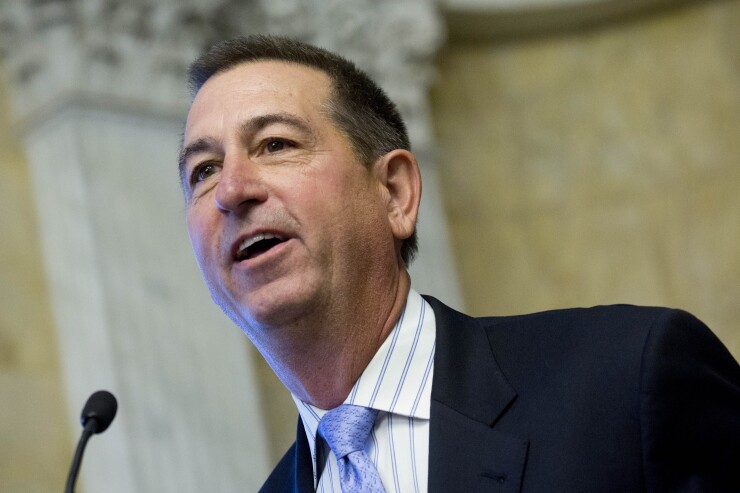WASHINGTON — State regulators said Wednesday they intend to refile a lawsuit against the Office of the Comptroller of the Currency in an effort to block it from offering a new federal bank charter for fintech firms.
The Conference of State Bank Supervisors said its board recently decided to proceed with another round of litigation against the national bank regulator now that the agency said July 31 it would offer a so-called special-purpose national bank charter to fintech firms.
This will be the state regulators' second attempt at blocking the OCC in court. The group first filed a lawsuit in April 2017, but a judge dismissed the case because at the time the OCC had not yet determined whether it would offer the charter. The concept was first proposed by the then-Comptroller Thomas Curry, but it was unclear how the new administration would proceed under Comptroller Joseph Otting until he recently made a final decision to move forward on the proposal.

In response, the CSBS said it will refile its suit “at a time deemed appropriate.” The underlying argument will remain the same, namely that the OCC has overreached its statutory authority under the National Bank Act by allowing nonbanks to become banks.
"We continue to have the same view about the OCC’s legal authority as the day we filed our original complaint,” said Margaret Liu, senior vice president and deputy general counsel at the CSBS. “From a public policy standpoint, it is an improper distortion of the market and dictates who are the winners and losers.”
An OCC spokesman responded Wednesday that the agency's new charter was within its legal limits.
“The agency is confident in its authority to grant national bank charters, including special purpose national bank charters to companies that are engaged in the business of banking, meet the qualifications for becoming a national bank, and apply to conduct business as part of the federal banking system,” OCC spokesman Bryan Hubbard said in a statement. “The agency will vigorously defend that authority, but will not comment on pending or potential litigation.”
Even though the OCC is currently offering the fintech charter, observers said companies are waiting to apply because of the pending battle between the OCC and state regulators, which could delay the application process and make it more costly for firms.
“Fintech companies are hesitant to file for the OCC’s new charter due to potential litigation from state regulators or their organization,” said Scott Talbott, senior vice president of government relations at the Electronic Transactions Association. “Eventually, somebody, likely a more mature fintech company, will be the first mover, but they need to be confident that their application will likely be approved.”
The Treasury Department has also endorsed the OCC’s fintech charter in a larger report released July 31 that made more than 80 recommendations on how to supervise fintech firms. A top Treasury Department official said Wednesday said it needs to learn more about the state regulators' objection to the charter.
The CSBS "did not react particularly well to our recommendations. We want to work with them to really understand their point of view,” Craig Phillips, counselor to the Treasury secretary, said during a financial forum in Washington Wednesday. “The state regulators are going to play a role in this” but “if we’re going to advance innovation, we really got to create a framework for entities to be operating nationally.”
The New York State Department of Financial Services also previously sued the OCC over the fintech charter. Like the CSBS suit, the New York case was dismissed by the judge because it was considered premature. Many expect the state to sue again, particularly after comments made by its top regulator over the summer.
“DFS believes that this endeavor, which is also wrongly supported by the Treasury Department, is clearly not authorized under the National Bank Act,” Maria Vullo, the superintendent of the department, said in a July 31 press release. “As DFS has noted since the OCC’s proposal, a national fintech charter will impose an entirely unjustified federal regulatory scheme on an already fully functional and deeply rooted state regulatory landscape.”





